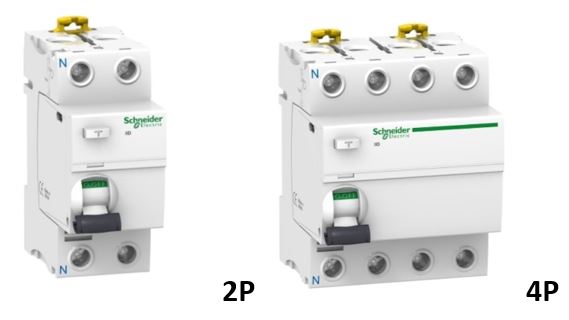TRIGGER RCTD A, 63A 30mA, 4P inst.mod
Valid Article
RESIDUAL CURRENT DEVICE
Definition
An RCD is used in an electrical installation to protect ourselves from ‘leakage' or shocks. It also has a positive impact on the reduction of the fire risk. For ‘leakage' a 30 mA current is the maximum to protect people from lethal shocks. RCD's are used in combination with MCB's (that protect against short circuits and overload). For more information check the electrical support documents and guideline.
Overview of different types of circuit breakers:
| abbreviation | English key word | description |
| MCB | Miniture=Miniature Circuit Breaker | Protects against overloads and shortcircuits |
| RCCB / RCD | Residual Current Circuit Breaker / Residual Current Device | Protects people against electrical leakages |
| RCTD | Residual Current Trigger Device | RCCB that mechanically triggers a compatible MCB attached to the RCTD |
| RCBO | Residual Current Breaker with Overload protection | combines the functions of an MCB and an RCD |
Synonym
ALCI, GFCI, GFI, RCCB
An RCCB is an RCD, but it is a circuit breaker that can be installed stand alone. When we talk about an RCD Trigger or bloc (bloc differentiel) we are talking about a device that will work together with an MCB: brands must be the same in order to instal easily.
Specifications
- Device that cuts the electrical power in case of ‘leakage' current.
- Trips at the ‘leakage' current stated at the RCD.
- There are three common types supplied by MSF: A, AC and ASI-type.
- They are available for single and three-phase.
- They are available in 25, 40, 63 and 80 A maximum current.
- Should be fitted in DIN rail.
The article is open. There are many brands on the market, some of them of poor quality.
Types
Besides the choice in maximum current (please note that they will NOT trip at this maximum), there are three types supplied by MSF:
- A: for all normal appliances.
- AC: hardly used anymore; only intended for pure AC loads (appliances without electronics).
- B: Type B RCDs can detect sinusoidal AC, pulsating DC, composite of multi-frequency as well as smooth DC residual currents. Type B RCD are intended to be used for loads with three-phase rectifier, such as variable speed drives, PV system, EV charging station and medical equipment.
- ASI: (also referred to as Hpi and HI): less sensitive for lightning and other causes (like frequency converters) preventing so-called nuisance tripping.
Sensitivity
MSF supplies 10 mA, 30 mA, 300 mA and 500 mA.
- 10 mA and 30 mA will protect people.
- 300 and 500 mA can be used to indicate faults. (like poor insolation in underground cabling) but do NOT protect people.300/500 mA sensitivity RCDs provides a good protection against fire risk due to insulation failure between live conductor and earth.
Norms
EN 60947-2
Dimensions
2P: 36 mm wide (‘2 units' wide)
3P+N: 72 mm wide (‘4 units' wide)
Instructions for use
Do not connect one RCD/RCCB with more than 5 MCB's to prevent the so-called nuisance tripping.
The RCD bloc must be ordered with its MCB or at least have an MCB of the same brand in order to install it in the proper way (this is a way to make an RCBO).
More information on the book MSF & ICRC : Rule and Tools (Electrical Installations and Equipment in the Field) in page 93
Testing
Test monthly using the test button
MSF requirements
Codified as:
PELEMRCB for residual current circuit breaker
PELEMRCT for residual current Trigger device

